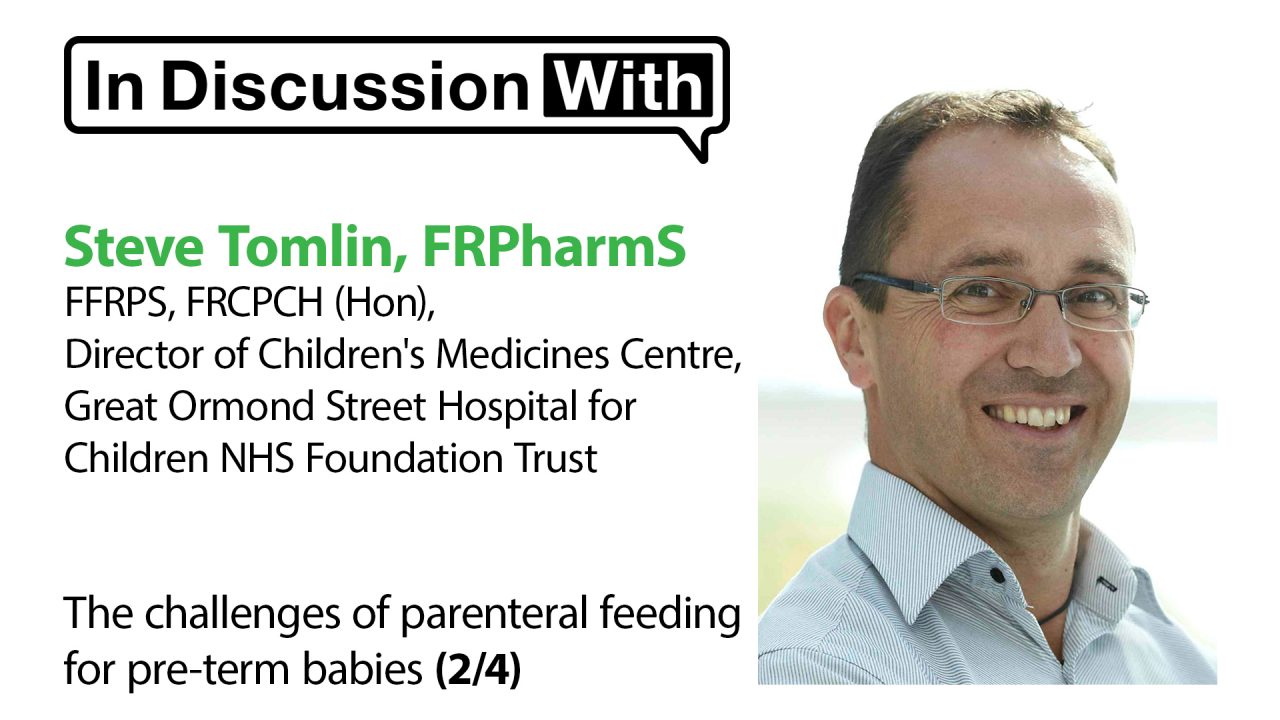Advertisment
The challenges of parenteral feeding for pre-term babies

A parenteral nutrition solution contains about 50 different components and is critical for survival and growth of a pre-term infant. Managing such products requires a good understanding of both the chemistry and the clinical factors and pharmacists are the right people to do this, argues Steve Tomlin, Director of the Children’s Medicines Research and Innovation Centre (CMRIC) at Great Ormond Street Hospital for Children in London.
Survival rates in premature babies
At the beginning of Mr Tomlin’s career babies born at 28 weeks’ gestation had a 50% survival rate but now this applies to babies born at 24 weeks’ gestation. This reflects the advances in care that have taken place over the past 30 years. These include ventilation, medicines and parenteral nutrition together with the development of much more holistic care than was given in the past, he explains.
Parenteral nutrition
Parenteral nutrition (intravenous feeding) is an important element of neonatal care. Parenteral nutrition solutions represent some of the most complex products that are administered to patients. “A bag of parental nutrition is about 50 different drugs; 50 different elements and we throw them all in a bag together and we tweak them and we up some and we down some and yet some of those do interact – and the importance of getting it right is huge – both from a clinical point of view and from a manufacturing point of view ……… I think that’s what really enhanced my enthusiasm for delving into it, trying to understand it more both from a clinical point of view but also from a pharmaceutical point of view”, says Mr Tomlin. Parenteral nutrition solutions are excellent growth media and micro-organisms can grow rapidly in them. For this reason, keeping the products sterile and avoiding manipulation (e.g. making additions) on the ward is critical. Managing parenteral nutrition draws upon “all of those bits that you went to university and learned. It’s the chemistry, it’s the pharmaceutics, it’s the clinical aspect – and it’s how all of those interact together. Therefore, I think we have to make the most of all the skills that we learned”, he adds.
Standardisation of products
Mr Tomlin advocates the use of standardised parenteral nutrition solutions in neonatal practice. One important reason for this is that whereas other functions e.g. blood pressure are continuously monitored and alarms sound if there are major changes, for parenteral nutrition there are no alarms to tell the clinician about impending problems. Standardised parenteral nutrition products provide correctly balanced quantities of nutrients. Another important consideration is that the patients are very small and adjustments often require only very small amounts. “When you’re adding a tiny, tiny amount ….. trying to get that right is very, very hard and there are lots and lots of really good studies showing how inaccurate those are”, he explains.
“Whether it’s IVs or whether it’s oral I generally advocate for standardisation. It doesn’t mean it works for everybody but it does allow you then to concentrate on the smaller proportion that can’t use the standards – and therefore get it right. …. It’s not about saying that ‘one size fits all’. Just because you’re standardising a concentration you can still give whatever dose that you want. I think that is really important and so often the wrong messages get out there to do with standardisation. It’s understanding what is being standardised and why but all of the three standardisations that I’ve just talked about I think are absolutely important. … There is a lot more work to do but that’s why I’m such an advocate”, he says.
About Steve Tomlin
Steve Tomlin is Director of the Children’s Medicines Research and Innovation Centre (CMRIC) at Great Ormond Street Hospital for Children in London. He is also the professional lead of the Neonatal and Paediatric Pharmacists’ Group (NPPG) and the vice-chair of the Joint Medicines Committee at the Royal College of Paediatrics and Child Health (RCPCH)
The Children’s Medicines Research and Innovation Centre is concerned with advancing practice for children’s medicines both in terms of improving medicines themselves and improving the usage and effectiveness of medicines in practice.
Read and watch the full series on our website or on YouTube.





